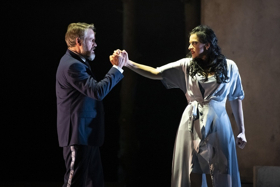Review: MACBETH, Hackney Empire

![]() There is something very noble about the mission of English Touring Opera to bring the art form to parts of the country that would normally never see it. They often bravely overlook the Popular Productions and turn to lesser-known ones such as Mozart's Idomeneo and Rossini's Elizabeth I. As part of their spring season, they look to Verdi's first adaptation of a Shakepearean play with Macbeth.
There is something very noble about the mission of English Touring Opera to bring the art form to parts of the country that would normally never see it. They often bravely overlook the Popular Productions and turn to lesser-known ones such as Mozart's Idomeneo and Rossini's Elizabeth I. As part of their spring season, they look to Verdi's first adaptation of a Shakepearean play with Macbeth.
William Shakepeare's works provided Guiseppe Verdi with a lifetime of inspiration. Macbeth was the first play he adapted into an opera and Verdi embraced the darkly violent world that Shakespeare created. The score sees the work of the composer at its most theatrical: it bristles with dark intention and demonic energy.
His interpretation of the story includes some successful changes such as the omission of the three witches, who are replaced by a chorus. There were also some less successful elements, such as the ballet that was created for the later version Verdi wrote to be performed in Paris, that is now usually omitted.
Verdi follows the general story of Scottish nobleman Macbeth, told that he will become King of Scotland. This sets Macbeth and his wife on a murderous course in their quest for power, that leads to their ultimate destruction and downfall.
As an opera, Macbeth is missing the traditional soprano-tenor love story that audiences are so used to. Verdi removes all lightness in the play, such as the Porter scene, preferring to concentrate on the dark and turbulent power play between Macbeth and Lady Macbeth.
Australian Grant Doyle is Macbeth. He is a fine actor, but lacks the brooding and introspective character essential for the role. His vocals take a little while to warm up, but his final desperate aria, after a rather lacklustre fight with Macduff, is suitably emotional.
Verdi famously declared he did not want the soprano who played Lady Macbeth to have a beautiful voice, rejecting the Bel Canto style altogether. It was more important that she showed a dark and demonic edge to the vocals in the yearning for control and power. Madeleine Pierard as Lady Macbeth has moments of ugliness necessary for the role, but fails to convey a truly convincing display of mental disintegration in the sleepwalking scene. There is nice colour to her voice and she is technically confident in this challenging role, although she loses power on a couple of the top notes.
Verdi reduced the roles of Malcolm and Macduff to almost nothing. Amar Muchhala makes the most of his slimmed down part as Macduff. Andrew Slater as Banquo gives a competant demonstration of Verdian basso cantante singing in Banquo's aria of foreboding.
The chorus are on good form here, with the refugees' lament at the start of Act IV being a highlight, full of pathos and balanced emotion. The all-female witches chorus reveals some voices dominate over others and occasionally projection is an issue.
Gerry Cornelius conducts his first opera for ETO. His treatment of the chorus sections is lively to the point of being jaunty and the whole production canters along without pause.
Andrew Porter's translation lifts many lines directly from Shakespeare, but it also suffers on occasion from over-simplification. There is a lack of poetry in much of wording of the production and it sometimes feels didactic.
Frankie Bradshaw's design bases the action in a brutalist concrete setting, where it is constantly nighttime and burning oil drums twinkle off menacing CCTV cameras. The costumes are a slightly bizarre hybrid of styles. Macbeth and the nobles are dressed in smart military suits, with the armies more like a ragtag militia with beanie hats and combat donkey jackets. The witches chorus is dressed in outfits that are reminiscent of Victorian nurses or nuns habits, made from what looks like green medical scrubs.
This is an ambitious opera for any company to stage and while this English Touring Opera production has moments of great pathos and emotion, it fails to ignite on every level.
Macbeth by the English National Opera is now touring
Photo Credit: Richard Hubert Smith
Reader Reviews

Videos

